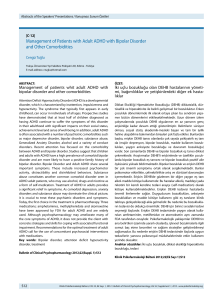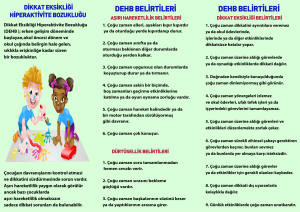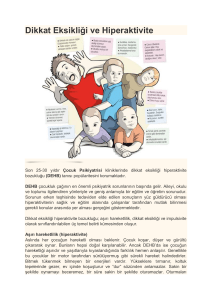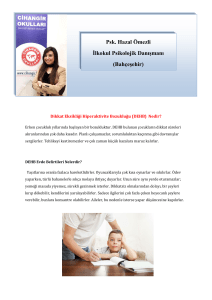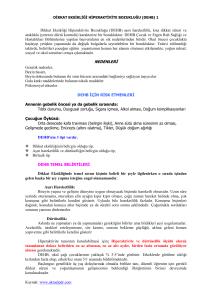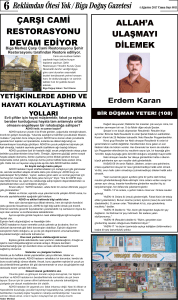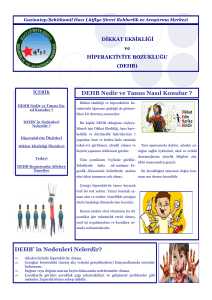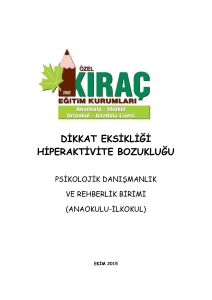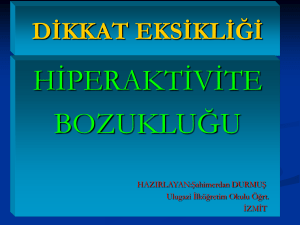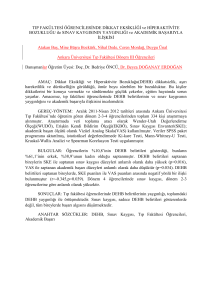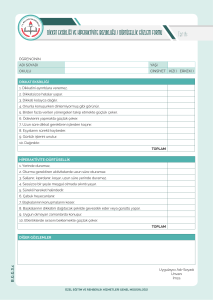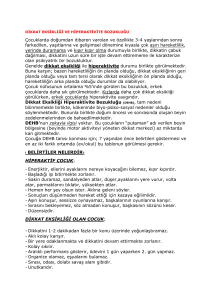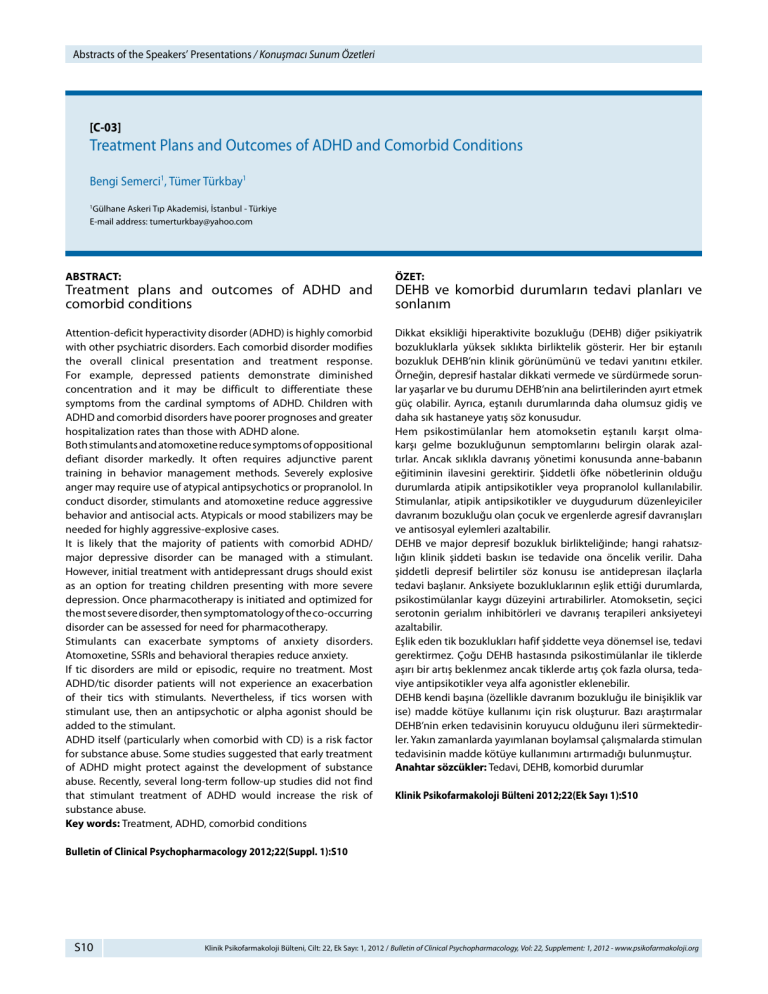
Abstracts of the Speakers’ Presentations / Konuşmacı Sunum Özetleri
[C-03]
Treatment Plans and Outcomes of ADHD and Comorbid Conditions
Bengi Semerci1, Tümer Türkbay1
1
Gülhane Askeri Tıp Akademisi, İstanbul - Türkiye
E-mail address: [email protected]
ABS­TRACT:
ÖZET:
Attention-deficit hyperactivity disorder (ADHD) is highly comorbid
with other psychiatric disorders. Each comorbid disorder modifies
the overall clinical presentation and treatment response.
For example, depressed patients demonstrate diminished
concentration and it may be difficult to differentiate these
symptoms from the cardinal symptoms of ADHD. Children with
ADHD and comorbid disorders have poorer prognoses and greater
hospitalization rates than those with ADHD alone.
Both stimulants and atomoxetine reduce symptoms of oppositional
defiant disorder markedly. It often requires adjunctive parent
training in behavior management methods. Severely explosive
anger may require use of atypical antipsychotics or propranolol. In
conduct disorder, stimulants and atomoxetine reduce aggressive
behavior and antisocial acts. Atypicals or mood stabilizers may be
needed for highly aggressive-explosive cases.
It is likely that the majority of patients with comorbid ADHD/
major depressive disorder can be managed with a stimulant.
However, initial treatment with antidepressant drugs should exist
as an option for treating children presenting with more severe
depression. Once pharmacotherapy is initiated and optimized for
the most severe disorder, then symptomatology of the co-occurring
disorder can be assessed for need for pharmacotherapy.
Stimulants can exacerbate symptoms of anxiety disorders.
Atomoxetine, SSRIs and behavioral therapies reduce anxiety.
If tic disorders are mild or episodic, require no treatment. Most
ADHD/tic disorder patients will not experience an exacerbation
of their tics with stimulants. Nevertheless, if tics worsen with
stimulant use, then an antipsychotic or alpha agonist should be
added to the stimulant.
ADHD itself (particularly when comorbid with CD) is a risk factor
for substance abuse. Some studies suggested that early treatment
of ADHD might protect against the development of substance
abuse. Recently, several long-term follow-up studies did not find
that stimulant treatment of ADHD would increase the risk of
substance abuse.
Key words: Treatment, ADHD, comorbid conditions
Dikkat eksikliği hiperaktivite bozukluğu (DEHB) diğer psikiyatrik
bozukluklarla yüksek sıklıkta birliktelik gösterir. Her bir eştanılı
bozukluk DEHB’nin klinik görünümünü ve tedavi yanıtını etkiler.
Örneğin, depresif hastalar dikkati vermede ve sürdürmede sorunlar yaşarlar ve bu durumu DEHB’nin ana belirtilerinden ayırt etmek
güç olabilir. Ayrıca, eştanılı durumlarında daha olumsuz gidiş ve
daha sık hastaneye yatış söz konusudur.
Hem psikostimülanlar hem atomoksetin eştanılı karşıt olmakarşı gelme bozukluğunun semptomlarını belirgin olarak azaltırlar. Ancak sıklıkla davranış yönetimi konusunda anne-babanın
eğitiminin ilavesini gerektirir. Şiddetli öfke nöbetlerinin olduğu
durumlarda atipik antipsikotikler veya propranolol kullanılabilir.
Stimulanlar, atipik antipsikotikler ve duygudurum düzenleyiciler
davranım bozukluğu olan çocuk ve ergenlerde agresif davranışları
ve antisosyal eylemleri azaltabilir.
DEHB ve major depresif bozukluk birlikteliğinde; hangi rahatsızlığın klinik şiddeti baskın ise tedavide ona öncelik verilir. Daha
şiddetli depresif belirtiler söz konusu ise antidepresan ilaçlarla
tedavi başlanır. Anksiyete bozukluklarının eşlik ettiği durumlarda,
psikostimülanlar kaygı düzeyini artırabilirler. Atomoksetin, seçici
serotonin gerialım inhibitörleri ve davranış terapileri anksiyeteyi
azaltabilir.
Eşlik eden tik bozuklukları hafif şiddette veya dönemsel ise, tedavi
gerektirmez. Çoğu DEHB hastasında psikostimülanlar ile tiklerde
aşırı bir artış beklenmez ancak tiklerde artış çok fazla olursa, tedaviye antipsikotikler veya alfa agonistler eklenebilir.
DEHB kendi başına (özellikle davranım bozukluğu ile binişiklik var
ise) madde kötüye kullanımı için risk oluşturur. Bazı araştırmalar
DEHB’nin erken tedavisinin koruyucu olduğunu ileri sürmektedirler. Yakın zamanlarda yayımlanan boylamsal çalışmalarda stimulan
tedavisinin madde kötüye kullanımını artırmadığı bulunmuştur.
Anahtar sözcükler: Tedavi, DEHB, komorbid durumlar
Treatment plans and outcomes of ADHD and
comorbid conditions
DEHB ve komorbid durumların tedavi planları ve
sonlanım
Kli­nik Psikofarmakoloji Bülteni 2012;22(Ek Sayı 1):S10
Bulletin of Clinical Psychopharmacology 2012;22(Suppl. 1):S10
S10
Klinik Psikofarmakoloji Bülteni, Cilt: 22, Ek Sayı: 1, 2012 / Bulletin of Clinical Psychopharmacology, Vol: 22, Supplement: 1, 2012 - www.psikofarmakoloji.org

